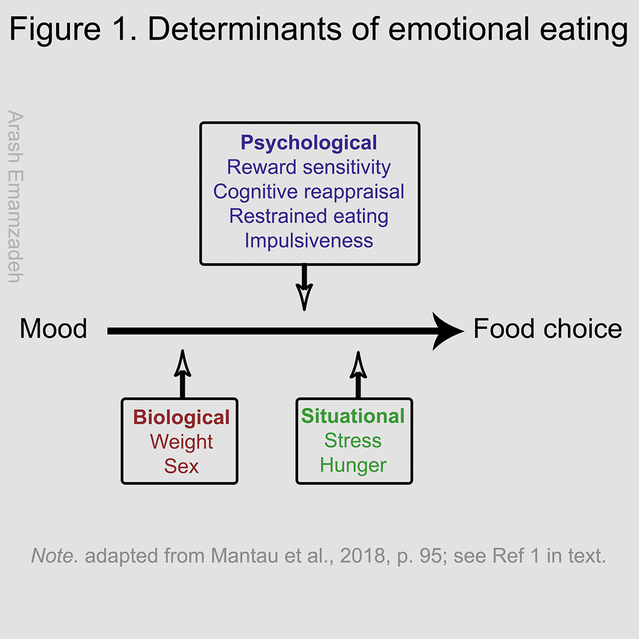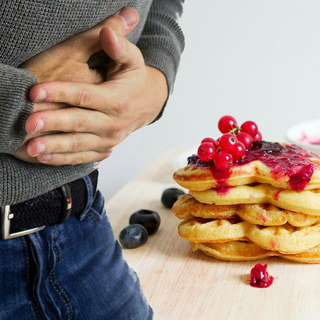Appetite
Why We Engage in Emotional Eating
Stress and restrained eating are associated with emotional eating.
Posted January 2, 2019 Reviewed by Abigail Fagan
How do you stop eating emotionally? Emotional eating (sometimes called stress eating or comfort eating) is difficult to control partly because we have no control over its biological determinants, such as our genetics. But what if other factors, ones that are easier to modify, were of greater importance to emotional eating? These other determinants—according to an article in the November 2018 issue of Appetite—are psychological and situational: hunger and stress level.

What is emotional eating?
Emotional eating refers to the consumption of food for the purpose of regulating one’s emotional states.
Eating palatable foods—commonly, foods that are sweet, fatty, or high in carbs—may improve our mood temporarily, but that short-lived comfort comes at the cost of weight gain and other health issues.
Stress is only one potential cause of emotional eating. Below I briefly describe three classes of determinants of emotional eating. I then review the present research study.
1. Situational determinants of emotional eating
Situational determinants are current circumstances and situational factors that influence eating behaviors. Two common situational factors are hunger and stress.
As noted above, when people are under a lot of stress—be it related to school, work, or relationship problems—they are more prone to stress eating. Why? Perhaps because they associate feelings of stress with sensations of hunger.
In addition, emotional eating is associated with sensations of hunger; these sensations are influenced by both normal hunger (i.e. energy deficiency) and hedonic hunger (i.e. urges, feelings, and thoughts about food).
2. Psychological determinants of emotional eating
Psychological determinants are personality-related factors related to motivation and self-regulation.
Restrained eating
Restrained eating refers to restriction and monitoring of what one eats. Restrained eaters think about food constantly, which may be why they are more likely to eat emotionally when feeling unhappy or stressed.
Impulsiveness
Impulsiveness is the tendency to act without thinking: Impulsive individuals do not consider the consequences of their unhealthy food consumption behavior.
Reward sensitivity
Reward sensitivity is the degree to which one is responsive toward rewards of a behavior. For instance, some people are more responsive to the mood-lifting properties of junk food or comfort food.
Cognitive reappraisal
Cognitive reappraisal is related to how one cognitively evaluates an emotion-eliciting situation. Emotional eaters are less likely to use cognitive reappraisal. For instance, a stress eater can only look back at an unsuccessful interview as a humiliating failure; not as a valuable lesson or even an interesting adventure.
3. Biological determinants of emotional eating
One biological factor associated with eating emotionally is weight status. Compared to normal-weight people, overweight individuals are more likely to overeat after experiencing unpleasant feelings. The reasons for this are not clear, although some research indicates being overweight is associated with a greater sensitivity to emotions.
Another determinant is biological sex. Compared to men, women—partly due to their biological dispositions (e.g., hormonal changes)—are more prone to experiencing intense feelings. That might be why women are more likely than men to use eating as a way to regulate their mood.

Mantau and colleagues’ study of emotional eating
Overeating (or eating junk food) is not the only response to negative emotions—certainly not in everyone or at all times. Sometimes people eat less when stressed. So what determines who eats emotionally...and when? That is what the study by Mantau et al. tried to answer. These researchers simultaneously examined multiple factors (including the ones reviewed; see Figure 1 linked to emotional eating.
Participants were 179 university students (average age of 23 years), randomly assigned to negative and positive mood conditions. In the former condition, students read a sad scenario (imagining a sudden ending to their romantic relationship); in the latter, they read a happy one (imagining a chance meeting with old friends).
Participants initially completed various questionnaires (measuring their current stress level, cognitive reappraisal ability, reward sensitivity, and temporal orientation); they then read their respective happy or sad scenarios.
Subsequently, the students were offered a healthy/unhealthy granola bar. They were told they would receive these bars after completing the rest of the study—which included additional questions regarding hunger, education, and restrained eating.
The results showed that of all factors examined, only stress level and restrained eating were significantly related to emotional eating.
Specifically, when stress was high, negative mood was more strongly linked to making unhealthy food choices.
Similarly, high restrained eating was associated with increased likelihood of choosing an unhealthy granola bar in the negative (as opposed to positive) mood condition.
How to control stress eating?
As we saw, the above study concluded that stress eating is more strongly related to psychological and situational factors, compared with biological ones. This is good news because we have more control over the first two factors.
So how to stop stress eating?
If you are a restrained eater, anticipate situations that may cause conflict between your healthy food choices (in accordance with your diet) and unhealthy options.

For example, while shopping, try to anticipate that if you buy unhealthy food, later at home you will experience a conflict between choosing healthy food and tempting foods. To avoid such conflict, you may then reason, it is best to limit how much unhealthy food you purchase.
It is also important to avoid shopping when feeling stressed, and to reduce your exposure to high-stress situations while shopping (e.g. stores with narrow aisles, times when stores are overcrowded).
Finally, learn how to manage stress more effectively—by learning time management, problem solving, conflict resolution, mindfulness, etc.
Concluding thoughts on comfort eating
The study reviewed here found that numerous determinants of stress eating—biological sex, weight, hunger level, impulsiveness, reward sensitivity, or cognitive reappraisal—did not affect emotional eating significantly. Only stress level and restrained eating had a major effect.
Suggestions for controlling emotional eating include managing stress and thinking and planning ahead. So do not shop when hungry, stressed, or when the store is crowded. And anticipate how having unhealthy food at home may affect food choices later—when you are hungry or feel stressed and do not have the willpower to resist those fatty, salty, or (my favorite) chocolaty temptations.
References
1. Mantau A., Hattula S. & Bornemann T. (2018). Individual determinants of emotional eating: A simultaneous investigation. Appetite, 130, 93-103.




